Tahiti

Beez Neez now Chy Whella
Big Bear and Pepe Millard
Sat 24 Aug 2013 22:07
 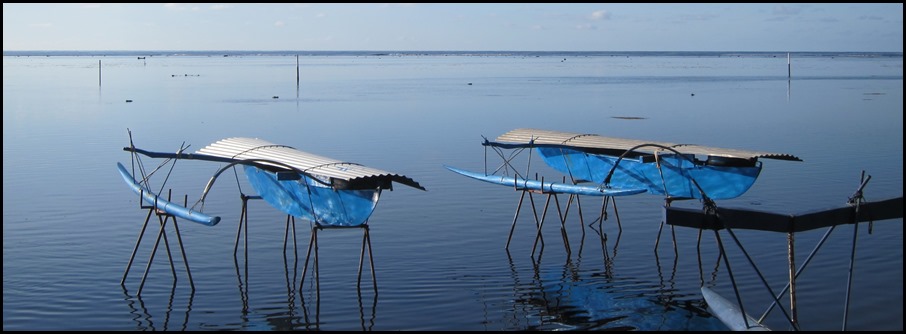 Tahiti is the largest island in the
Windward group of French Polynesia, located in the archipelago of Society
Islands in the southern Pacific Ocean. The island has a population of 178,133
according to an August 2007 census. The most populous island, accounting for
68.6% of the total population of French Polynesia. The capital, Papeete, is
located on the northwest coast. Tahiti has also been known as
O'tahiti.
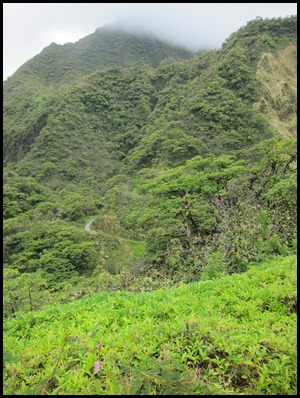
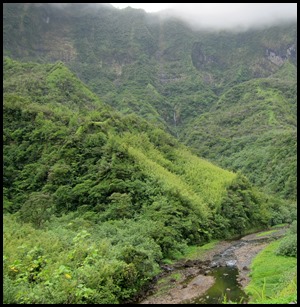
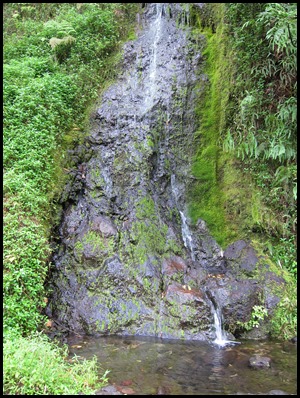 Geography: Tahiti
measures 27.96 miles across at its widest point, with a maximum elevation of
7352 feet (Mount Orohena). Mont Roonui in the southeast rises to 4370 feet. The
island consists of two roughly round portions centered on volcanic mountains,
connected by a short isthmus named after the small town of Taravao located
there. The northwestern portion is known as Tahiti Nui ("big Tahiti"), while the
much smaller southeastern portion is known as Tahiti Iti ("small Tahiti") or
Taiarapu. Tahiti Nui is heavily populated along the coast (especially around
Papeete) and benefits from roads and highways. The interior of Tahiti Nui is
almost entirely uninhabited. Tahiti Iti has remained isolated, as its
southeastern half (Te Pari) is accessible only to those traveling by boat or on
foot. The rest of the island is encircled by a main road which cuts between the
mountains and the sea. An interior road climbs past dairy farms and citrus
groves with panoramic views. Tahiti's landscape features lush rain forests and
many swift streams, including the Papenoo in the north.
November to April is the wet season;
the wettest month is January with 13.2 inches of rain in Papeete. August is the
driest with 1.9 inches. The average temperature ranges between 21 °C and 31 °C
with little seasonal variation.
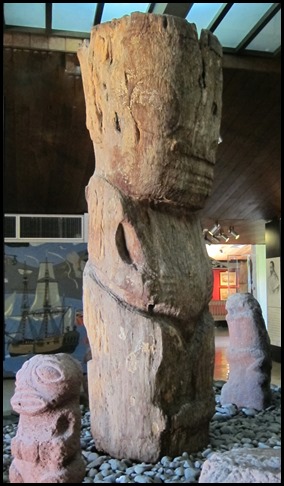 History: Tahiti is
estimated to have been settled between AD 300 and 800 by Polynesians, although
some estimates place the date earlier. The fertile soil combined with fishing
provided food.
Samuel Wallis, an English sea
captain, sighted Tahiti on the 18th of June 1767, and is considered the first
European visitor. (A later report of an earlier Spanish sighting of Tahiti by
Pedro Fernandez de Quiros in 1606 apparently is mistaken, through the confusion
in that report of Tahiti Island with La Sagitaria Island, to the SE of Tahiti
Island.)
The relaxed and contented nature of
the people and the characterisation of the island as a paradise impressed early
Europeans, the romanticism by the West endures to this day.
Wallis was followed in April 1768 by
the French explorer Louis-Antoine de Bougainville, completing the first French
circumnavigation. Bougainville made Tahiti famous in Europe when he published
Voyage autour du monde. He described the island as an earthly paradise where men
and women live happily in innocence, away from the corruption of civilization.
His account illustrated the concept of the noble savage and influenced utopian
thoughts of philosophers such
as Jean-Jacques Rousseau before the
French Revolution.
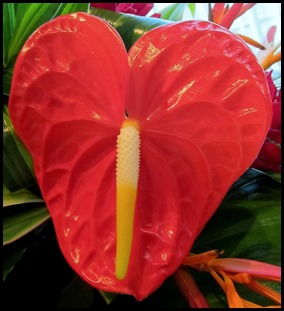 In April 1769 Captain James Cook
visited the island on secret orders from the Lords of the Admiralty to view the
Transit of Venus on the 2nd of June. He set up camp at Matavai Bay and stayed on
until the 9th of August. The population was estimated to be 50,000 including all
the nearby islands in the chain. After Cook, European ships landed with greater
frequency. The best-known was HMS Bounty, whose crew mutinied after leaving
Tahiti in 1789. The European influence disrupted traditional society, bringing
prostitution, venereal disease, alcohol and Christianity. The London Missionary
Society, founded in 1795, instructed its Tahitian missionaries to intervene in
what they saw as wretched conditions and demonic influence. Introduced diseases
including typhus, influenza and smallpox killed so many Tahitians that by 1797,
the population was only 16,000. Later it was to drop as low as 6,000.
Viceroy of Peru Manuel de Amat y
Juniet, following the rules of the Spanish Crown, decided to take possession of
the island in 1772, largely to control the expansion of other countries and also
to evangelise. He sent four expeditions between 1772-1775, but Charles III of
Spain cancelled the mission as a consequence of his secular policy. Most notable
of these expeditions was the drafting of a Diary by a soldier of the Marine
named Maximo Rodriguez, covering a period of 12 months, revealing many
ethnological details about the Tahitians of the eighteenth century.
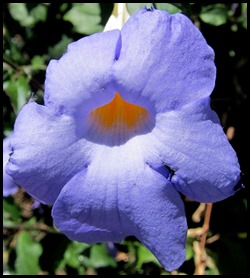 In November 1835 Charles Darwin
visited Tahiti aboard the HMS Beagle on her circumnavigation, captained by
Robert FitzRoy. He was impressed by what he perceived to be the positive
influence the missionaries had had on the sobriety and moral character of the
population. Darwin praised the scenery, but was not flattering towards Tahiti's
Queen Pomare IV. Captain Fitzroy negotiated payment of compensation for an
attack on an English ship by Tahitians, which had taken place in 1833.
In 1839 the island was visited by the
United States Exploring Expedition; one of its members, Alfred Thomas Agate,
produced a number of sketches of Tahitian life, some of which were later
published.
In 1842, a European crisis involving
Morocco escalated between France and Great Britain when Admiral Dupetit Thouars,
acting independently of the French government, convinced Tahiti's Queen Pomare
IV to accept a French protectorate. George Pritchard, a Birmingham-born
missionary and acting British Consul, was away at the time. On his return he set
about indoctrinating the locals against the Roman Catholic French. In November
1843, Dupetit-Thouars (again on his own initiative) landed sailors on the
island, annexing it to France. He threw Pritchard into prison, subsequently
sending him back to Britain.
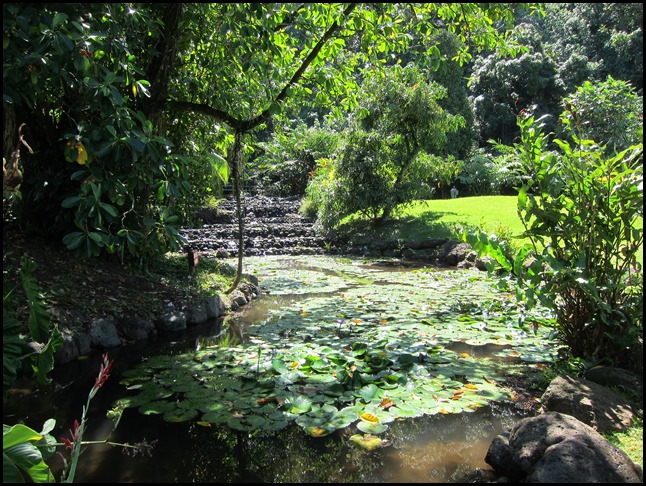 News of Tahiti reached Europe in
early 1844. The French statesman François Guizot, supported by King
Louis-Philippe of France, had denounced annexation of the island. However, war
between the French and the Tahitians continued until 1847. The island remained a
French protectorate until the 29th of June 1880, when King Pomare V (1842–1891)
was forced to cede the sovereignty of Tahiti and its dependencies to France. He
was given the titular position of Officer of the Orders of the Legion of Honour
and Agricultural Merit of France. In 1946, Tahiti and the whole of French
Polynesia became a Territoire d'outre-mer (French overseas territory). Tahitians
were granted French citizenship, a right that had been campaigned for by
nationalist leader Marcel Pouvana'a A Oopa for many years. In 2003, French
Polynesia's status was changed to that of Collectivité d'outre-mer (French
overseas community).
French painter Paul Gauguin lived on
Tahiti in the 1890’s and painted many Tahitian subjects. Papeari has a small
Gauguin museum. During the First World War, the Papeete region of the island was
attacked by two German warships. A French gunboat as well as a captured German
freighter were sunk in the harbor and the two German warships bombarded the
colony. Between 1966 and 1996 the French Government conducted 193 nuclear bomb
tests above and below the atolls of Moruroa and Fangataufa. The last test was
conducted on the 27th of January 1996.
 Language: Tahitians
are French citizens with complete civil and political rights. French is the
official language but the Tahitian language is also widely used, we have met
many locals who speak very good English. There was a time during the 60’s and
70’s however, when children were forbidden to speak Tahitian in schools. Present
day thinking has changed and the Tahitian language is now being taught, it is
sometimes even a requirement for employment.
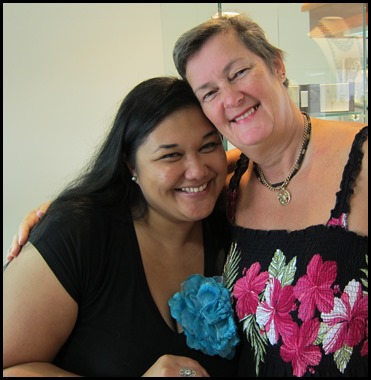 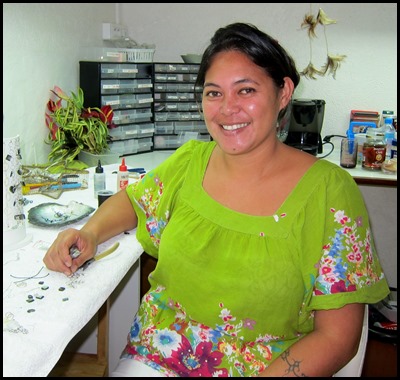 This is Emily
who was tireless with her patience, advice and help when we visited
Vaimiti Perles on Rue Jeanne d’Arc in Papeete. Vaimiti is the specialist pearl
producer, wholesale and retail shop highly recommended to us - thank you Chris
and Steve - to have the ‘girls pearls’ set. We popped in one morning to make
enquiries and I went back with our pearls after lunch. After Emily helped to get
the right settings, the pearls were handed to Paula
to drill (a very skilled craft), mount, polish and hand them back with the WOW
factor. I had expected to return to collect them a week later, definitely a few
days later, but no, glass of water and comfy chair, chatting to the ladies, the
afternoon sped by and I left with the gifts in beautiful presentation boxes.
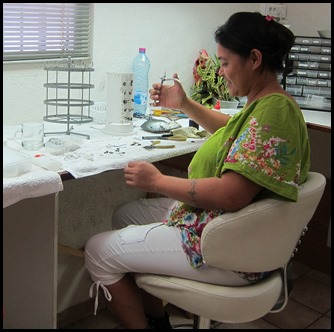 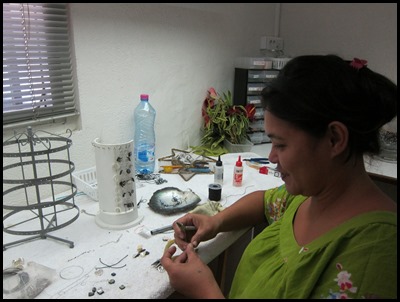 Paula,
making her magicians fingers work at lightning speed.
The People: I left
the ladies clutching a map that they had drawn for me, marking a shop we needed
to find. The next day off we went. The X on the map was not what we expected as
it was an office. The lady there welcomed us anyway and went to get a member of
staff who spoke fluent English. A very nice man appeared from his workstation –
this was one of those trendy open plan arrangements, all glass and security
doors. He asked what we were looking for and promptly went back through the
electronically tagged door and returned with the Yellow Pages. He then rang a
couple of people. Off he went again through the locked glass door, this time he
came back with a photocopy of the page we needed. We thanked him profusely, we
shook hands and went to our way. The next stop couldn’t help but the man there
put us on the right track. No matter what we have needed to source, collect, buy
or shop around for, we have found the most helpful, friendly, English speaking
people we could ever hope to meet.
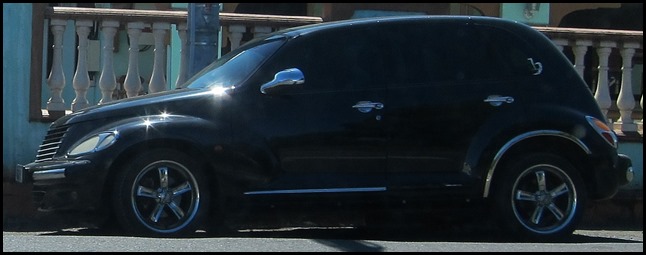 Bugs: Absolutely
delighted to say we have seen four bugs, three silver and this lady in sleek
black. What more would I want from any island. Could we live here full time,
yes, but I would feel the need to be fluent in French first. Too much more to
see anyway.
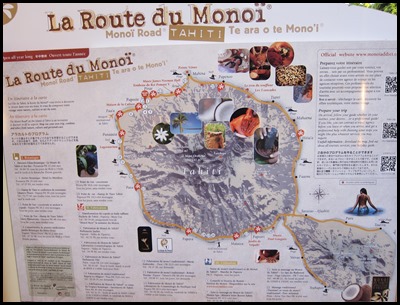 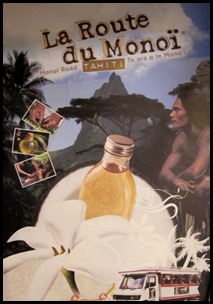 Economy: Tourism is
a significant industry, mostly to the islands of Bora Bora and Moorea, for
Europeans this can be a long journey with flights often via Los Angeles. In
July, the Heiva festival in Papeete celebrates Polynesian culture and the
commemoration of the storming of the Bastille in Paris. Black pearl farming is
also a substantial source of revenues, most of the pearls being exported to
Japan, Europe and the US. Tahiti also exports vanilla (often seen as the world’s
best in quality and taste, winning many competitions), fruits, flowers, monoi
(the tiare flower is one of Tahiti's gardenias, a perfume-oil is made from
soaking the petals and infused in a semi wax coconut oil, bottled, sold locally
and widely exported), fish, copra oil, and noni. The noni fruit comes from the
tree Morinda Citrifolia and are picked when yellow and ripe (omoto). The tree is
unique in that it bears fruit all year round. The fruit is squeezed to produce a
juice known for its natural tonic and has been enjoyed for thousands of
years.
Unemployment affects about 13% of the
active population, especially women and unqualified young people. Tahiti hosts a
French university, the University of French Polynesia. It is a growing
university, with 2,000 students and 60 researchers. Many courses are available
such as law, commerce, science and literature.
 Our Cost of Living:
You can buy a French Stick for thirty pence. Meat is very reasonable, if not
cheap. Fruit and Veg from the market is fairly reasonable, except that we saw a
watermelon for ten pounds........... Supermarket shopping is interesting, named
brands can be scary but shop brands are quite doable, so it’s only luxury goods
that would hurt the purse and quite frankly we have done without for so long we
don’t really salivate over ‘stuff’ anymore. Baked beans, tinned tomatoes and
mushrooms are on a par with the UK. Cleaning materials and smellies are very
expensive but we have a big supply on board. We bimbled into the Mac store,
because we could and its always nice to see what’s new in the techno world. An
IPod Touch was a whole 30% dearer then the UK price. Interestingly, we bought a
couple of new hard drives for our growing film collection and they were cheaper
than the UK. Bear has found that some bits and bobs he needed from the
chandleries were not bad to quite dear, I wonder if we average it all out if it
is not too dissimilar to living in say, France itself. Clothing is a big ouch, I
fell in love with a pretty little dress for Faye, Bear would never refuse me for
any of the grandchildren, but, did ask if I realised, that tiny scrap of cotton
is $80. I sighed and walked on, sorry Faye xx xx.
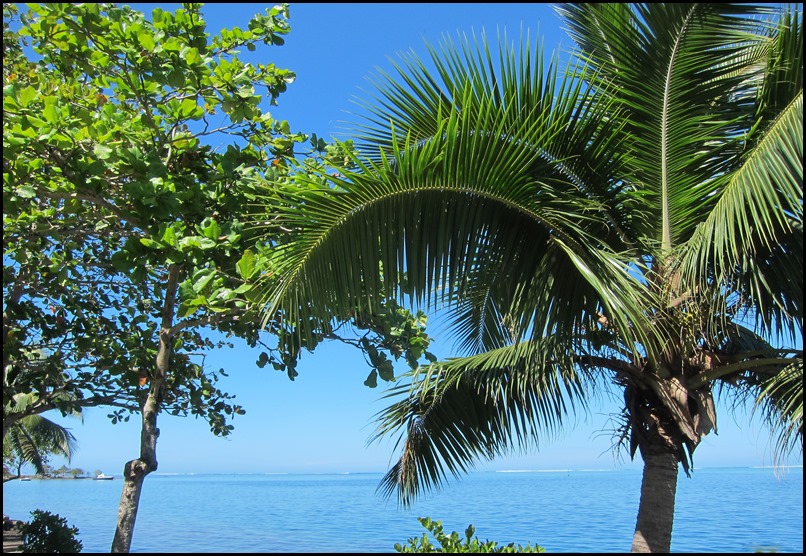 Dance: One of the
most widely recognised images of the islands is the world famous Tahitian dance.
The ʻōteʻa, sometimes written as otea, is the traditional dance of Tahiti, where
the dancers stand in several rows and and choreograph different figures. This
dance, easily recognised by its fast hip-shaking and grass skirts (often
confused with the Hawaiian hula). We have watched and enjoyed on many occasions
and blogged about in the Austral Islands. Here we have loved the street
performers in ones, twos and fours playing their ukuleles.
 The bigger groups of all ages have been
wonderful in the square each evening.
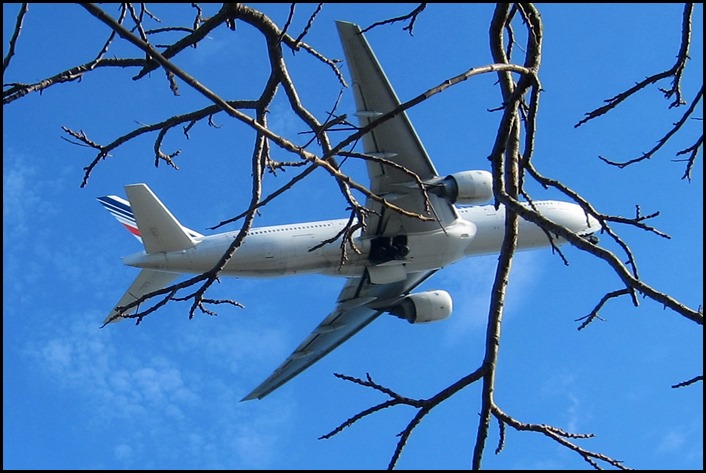 Transport: Faa'a International Airport is the
international airport of Tahiti with Air Tahiti Nui being the national airline
while Air Tahiti is the main airline for inter-island flights. The picture above
made us laugh – down the road is a look-out spot where many locals and tourists
gather to watch planes of all shapes and sizes take off. We were no different
and as there was a plane on the runway, we waited with everyone else, might have
made a lovely shot – ocean, Moorea, plane, but, guess who forgot she was using
her husbands camera and not her own.......so instead of a lovely scenic shot – I
pressed, and by the time the little camera had done its stuff, said plane was
over the trees. You Numpty. Mmmmmm. The Moorea Ferry operates from Papeete.
There are also several ferries that transport people and goods throughout the
islands.
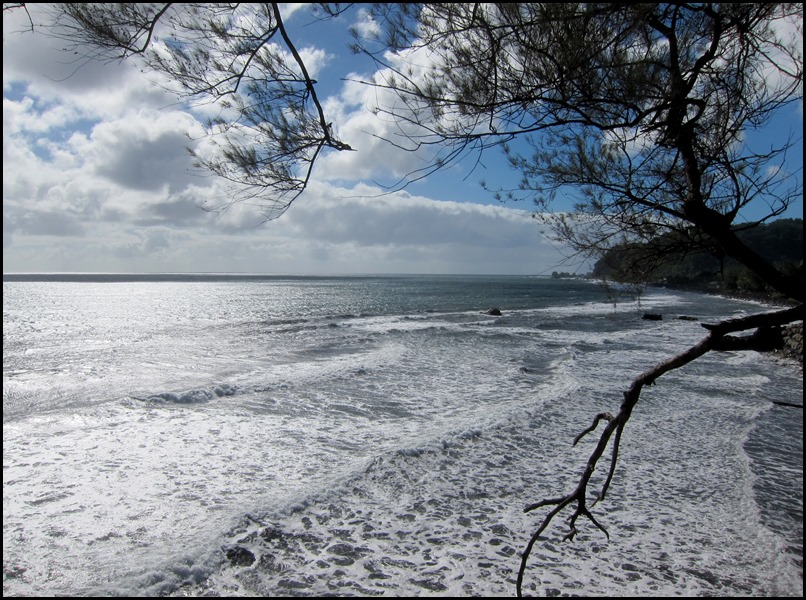 ALL IN ALL TAHITI HAS
EVERYTHING
AN ISOLATED PARADISE FULL OF
SURPRISES
|